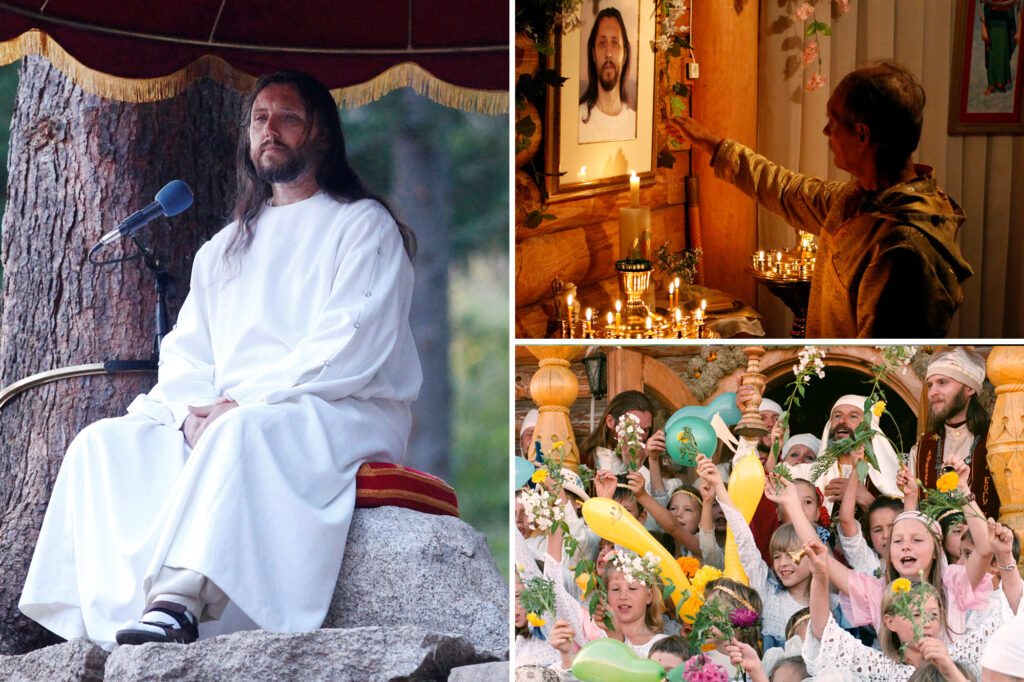A Siberian cult leader who claimed to be the reincarnation of Jesus Christ has been sentenced to 12 years in a Russian prison camp. Sergei Torop, known to his followers as “Vissarion,” was convicted for physically and financially exploiting his followers, causing them significant harm. The sentencing took place in the Siberian city of Novosibirsk, marking a dramatic end to a saga that captivated and alarmed many.
Torop, a former traffic policeman, founded the Church of the Last Testament in 1991, amid the chaos following the collapse of the Soviet Union. His movement, based in the remote Krasnoyarsk region of Siberia, attracted thousands of followers. Alongside Torop, two of his aides were also convicted; Vladimir Vedernikov received a 12-year sentence, while Vadim Redkin was sentenced to 11 years in a maximum-security prison camp.
The Rise of a Self-Styled Messiah
Sergei Torop’s transformation from a traffic officer to a self-proclaimed messiah began in the early 1990s. Known as “Vissarion,” which translates to “he who gives new life,” Torop claimed he was “reborn” to disseminate divine messages. His teachings, which included abstaining from meat, alcohol, and money, resonated with many Russians grappling with the economic turmoil and lawlessness of the post-Soviet era. His followers established a settlement called the “Abode of Dawn” or “Sun City,” where they sought to live according to his spiritual guidance.
The cult’s practices, however, drew scrutiny over the years. According to investigators, Torop and his aides used psychological pressure to extract money from followers, inflicting significant mental and physical harm. The Russian authorities, including the FSB security service, arrested the trio in a dramatic helicopter raid in 2020.
Legal Proceedings and Convictions
The legal proceedings against Torop and his aides were closely watched, shedding light on the darker aspects of the cult’s operations. The court found that the group had caused “moral harm” to 16 individuals, inflicted physical injuries on six others, and moderately harmed another person’s health. Additionally, Vedernikov faced charges of fraud, further complicating the legal battle.
“The conviction of Sergei Torop and his aides underscores the dangers posed by charismatic leaders who exploit vulnerable individuals,” said a legal expert familiar with the case.
The prosecution argued that Torop’s teachings and the cult’s lifestyle were not merely eccentric but dangerous, leading to severe consequences for many followers. The defense, however, maintained that the group’s activities were consensual and spiritual in nature.
Impact and Implications
The sentencing of Torop and his associates is seen as a significant move by Russian authorities to clamp down on cult activities that exploit individuals under the guise of spiritual enlightenment. Experts suggest that this case could set a precedent for future legal actions against similar groups operating in Russia and beyond.
Historically, Russia has had a complex relationship with religious movements, particularly those that deviate from Orthodox Christianity. The country has witnessed the rise and fall of various sects and cults, often leading to legal and social challenges.
As the dust settles on this high-profile case, questions remain about the future of the Church of the Last Testament and its followers. Some speculate that the movement may continue in a diminished capacity, while others believe it could disband entirely without its charismatic leader.
“This case highlights the need for vigilance and legal frameworks to protect individuals from exploitation by manipulative leaders,” said a sociologist specializing in religious movements.
Moving forward, the Russian government may increase oversight of religious groups, ensuring that they operate within legal and ethical boundaries. For now, the conviction of Sergei Torop serves as a cautionary tale about the potential perils of unchecked charismatic authority.
